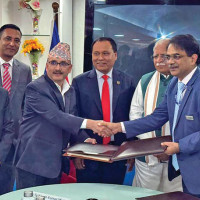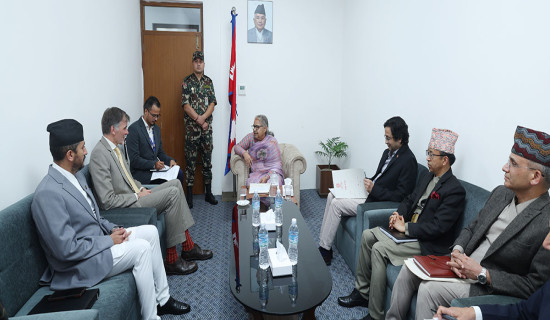- Thursday, 30 October 2025
Cellphone : A Devil For Kids?
The palmtop gadget by the name of mobile phone or cellphone doesn’t ask for a big hand today. Its father, Martin Cooper, himself might not have guessed how this would turned so vital in just 50 years. The gadget has invaded the skies, bringing nation-makers and nation-breakers together with their eyes, ears, hands, and minds. As a multiverse window, it flickers and twinkles now along all tiny moments and hours without a blink. No wonder the age of the information revolution is upon us and we live in it! But it’s simultaneously added a dark side too since parents and guardians say it’s a kind of devil for kids, especially preteens and fresh teens.
In a way, it’s so since they’re glued to its screen like guinea pigs more than their playmates! If you fancy a nuclear family in the morning, you’d find the parents and their kid together on the breakfast schedule. Mom readies the kid in his school uniform, and in turn, it holds her phone on the table. Its eyes are undivided over one screen feature. Mom is frantically preparing breakfast before the bus arrives. In hassles and short breaths, she then lays the breakfast on the table for its office-ready papa too. She feeds the child herself because its hands aren’t free. When she isn't wondering why each food bite doesn't move its lips, tongue, or teeth, the spoon in her hand ends up in its mouth. "Quick, quick, no time! Missing... this morning again!" and she cuts in another spoon.
Hunger
The insatiable hunger for it couldn’t excel the screen fantasy indeed! Papa in another chair has his eyes buried and the arms raised over the smartphone. She raises her eyebrows towards him, "Now, now, do you hear..?" since he’s over urgent emails and the biggest headlines. Thus the three of them, although at nose-length, are worlds apart, and no wonder again; this is a dirty big scene that one undergoes in most families today. A similar craze is everywhere: have a passing glance along roadsides, retailers and offices, parliamentarians and cabinet makers because this is an up-to-the-minute news sensor and GPS connector as the eighth wonder of science and technology! As if in zero ethics and regulations, it’s thus anytime with anybody!
Kids, however, are in focus here. It's agreed that this is a versatile tool; does it help them? Isn’t the radiation bad for their health and hygiene? Should they use it or not? Questions then arise. One British author, Roald Dahl, is dead against it. He says no because he says the screen is a kid's devil. As such he dislikes TV and calls it an idiot box. In his view, TV pulls kids away from playgrounds, playmates, and interactions down the lane. Likewise, the parents want to affirm that the phone screen is a mini-TV and so refuse to acknowledge it for the kids who have a fluid mind. Such screens, in their opinion, are a threat to the kids’ potential, creativity, and health.
What they wish for in their place are outdoor games, harmless pranks, and same-age connections. Though the opinion sounds good, unfortunately, such choices don’t appear everywhere. The metropolitan city of Kathmandu itself doesn’t have enough open spaces like fun parks and playgrounds! Another struggle is there as well—the hectic city life rarely puts the parents free for their kids! When moms are busy indoors, dads are crazy outdoors. The compulsion or focus is then on the screen. Nor can they raise walls and fences and bully or force the kids back—it'd cause rebellion!
There’s however another version in kids’ favor. It argues that watching it isn’t always bad or harmful. For this newly developed tool, here is a similar example. When Mohan Das Karma Chand Gandhi was in protest against the British Empire, his peaceful revolt spread a propaganda that the newly setup railways in Hindustan were not for the public's welfare. He even called the railroad technology a European ghost and a social taboo. Bertrand Russell later commented that Gandhi then truly couldn’t assess how its impact was just the reverse! The railways had soon become the lifeblood of cross-country connections.
There are almost identical perspectives on the children on the screen. Gradually, progressive pedagogics and child psychologists have comprehended its merits too. If bugs are minimised, its super-intelligent features have no agenda to make anyone their hostage. Parents so mustn’t think that kids are after the screen razzmatazz and fantasy only. In fact, many educative features are there that build their personality and IQ. I’ve observed some KG kids who are well able to drive its applications, choose features, text their dad messages, and, more importantly, learn English conversation skills. Along with this, the phone’s useful apps for digital literacy, primary math lessons, social networking, chess (games), etc. can be run with parental assistance.
Love and Care
Science is the father of technology, and technology is the father of science, while together they imply being constructive and forward-looking. The willingness to admit failure and try a different approach is a hallmark of science and technology. They provide clear-cut answers to social questions too. Thus, the children are not an object of bullying; rather, they require love and care because it is their age to learn new lessons and broaden their horizons. Education experts now trust the screen since it can teach different skills like dancing, singing, music, art, sports, etc. Likewise, schools can demonstrate its merits and teach when to use it, how to use it, for how long to use it, and when to stop using it. Teachers are more effective here because the kids follow the teachers’ words more than their parents. Community schools, particularly those in fierce competition, can improve their efficiency.
Not to be overlooked, meanwhile, are the blindfolds of razzmatazz and fantasy. They’d otherwise split the world into two parts—online and offline. Online is the internet, or Wi-Fi access. Online excesses, meanwhile, turn the kids distant, dependent, and dull. As a result, they must be taught and trained to be offline as well, which requires interaction with their physical surroundings. The illustrations of papa and his kid above show how they’ve distanced, alienated, and become less bonded. Thus, the message is clear: only the immediate worlds are true. Although it’s no surefire mantra, what we know is that potential in kids makes responsible citizens of tomorrow. Parents nonetheless require insight: they must prove to be loving, manage to be free and time-giving, discuss homework, crack jokes, listen to them talk and check their intelligence, take them on trips, go trekking, visit fun parks, open spaces, and take them to restaurants.
(The author is a retired lecturer of English at TU)



-original-thumb.jpg)

-square-thumb.jpg)











